| Srl | Item |
| 1 |
ID:
185564
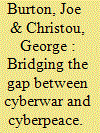

|
|
|
|
|
| Summary/Abstract |
The conceptual debate around the term cyber warfare has dominated the cybersecurity discipline over the last two decades. Much less attention has been given during this period to an equally important question: what constitutes cyber peace? This article draws on the literatures in peace and conflict studies and on desecuritization in critical security studies, to suggest how we might begin to rearticulate the cybersecurity narrative and shift the debate away from securitization and cyberwar to a more academically grounded focus on desecuritization and cyber peace. It is argued that such a move away from a vicious circle where states frame cybersecurity predominantly within a national security narrative and where they seek to perpetually prepare for cyberwar, to a virtual cycle of positive cyber peace, is not only a desirable, but a necessary outcome going forward. We assert that this is particularly important if we are to avoid (continuing) to construct the very vulnerabilities and insecurities that lead to the prioritization of offence and destruction in cyberspace, rather than transformative, human-centred development in information and communications technology innovation.
|
|
|
|
|
|
|
|
|
|
|
|
|
|
|
|
| 2 |
ID:
128921
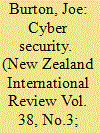

|
|
|
| 3 |
ID:
158415
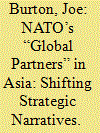

|
|
|
|
|
| Summary/Abstract |
This article analyzes how NATO officials perceive the Alliance’s global partnerships with Australia, New Zealand, Mongolia, South Korea, and Japan. In doing so, it seeks to establish the degree of conformity within the alliance about how useful and important the partnerships are, and connectedly, how NATO’s strategic narrative about its global security role is changing. The article argues that while NATO is committed to maintaining links with each of the countries analyzed, a process of retrenchment can be identified within the alliance, driven by the Russian annexation of Crimea in 2014 and a deteriorating security environment in the Middle East and North Africa. This is reflected in new strategic narratives within the alliance that focus on NATO’s eastern and southern flanks.
|
|
|
|
|
|
|
|
|
|
|
|
|
|
|
|
| 4 |
ID:
142257
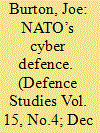

|
|
|
|
|
| Summary/Abstract |
NATO’s adaptation in the post-cold war era has included a growing role in responding to cyber attacks. This article explores the definitional and theoretical problems in analysing the emerging cyber security field and seeks to provide an outline of the main strategic challenges that cyber attacks pose for NATO. The article evaluates the institutional structures and processes put in place by NATO to confront cyber threats and moves on to explore the extent of transatlantic unity around NATO’s emerging doctrine for cyber defence. It is argued that NATO’s response to cyber security is rooted in its prior adaptation to the changing security environment of the 1990s and the threat from international terrorism post 9-11. More recently, cyber attacks from state and state-sponsored actors have given impetus to NATO’s emerging cyber security doctrine. The article finds that despite recent controversies over cyber surveillance, there is a considerable degree of unity within the alliance on the main cyber security issues. As a multilateral security organisation with a strong institutional foundation, NATO is also relatively well placed to respond to rapidly evolving cyber threats.
|
|
|
|
|
|
|
|
|
|
|
|
|
|
|
|
| 5 |
ID:
158417
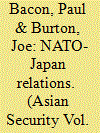

|
|
|
|
|
| Summary/Abstract |
The article uses Strategic Narrative Theory to explain how NATO has successfully communicated narratives of “natural partnership” and cooperative security to Japan. Japan strongly perceives NATO to be an embodiment and guarantor of global norms and international law. NATO and Japanese security commentators make a clear and consistent linkage between Russian and Chinese threats to international law respectively, as part of an extended deterrence strategy. We refer to this approach as one of “strategic parallelism.” Less positive dimensions of Japan–NATO relations are also considered: a significant majority of Japanese elite interviewees are critical of NATO’s handling of Russia and believe that this will have implications for the defense of the rule of law in the East and South China Seas. Japan has also reached out diplomatically to Russia, seeking a rapprochement that further undermines joint commitment to strategic parallelism.
|
|
|
|
|
|
|
|
|
|
|
|
|
|
|
|